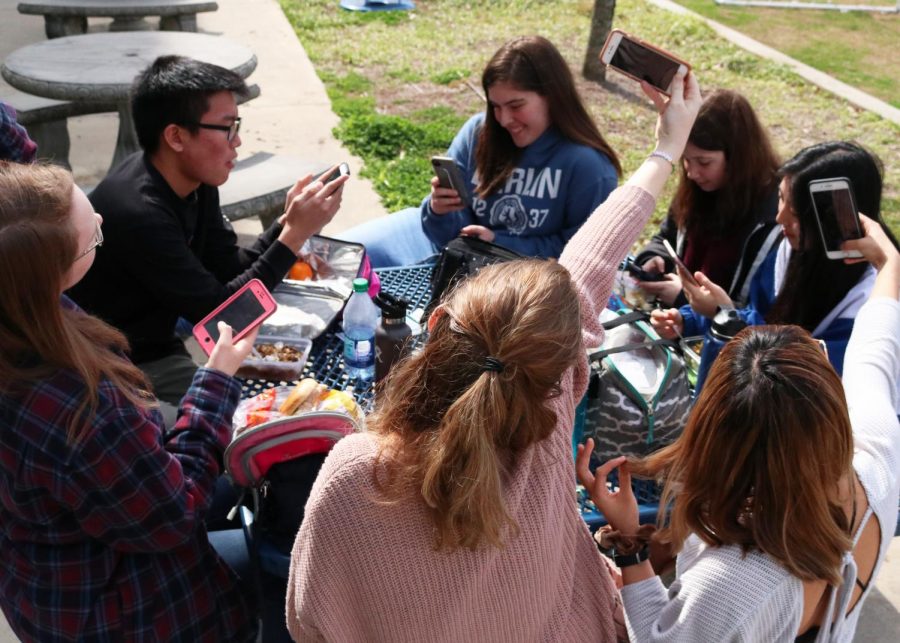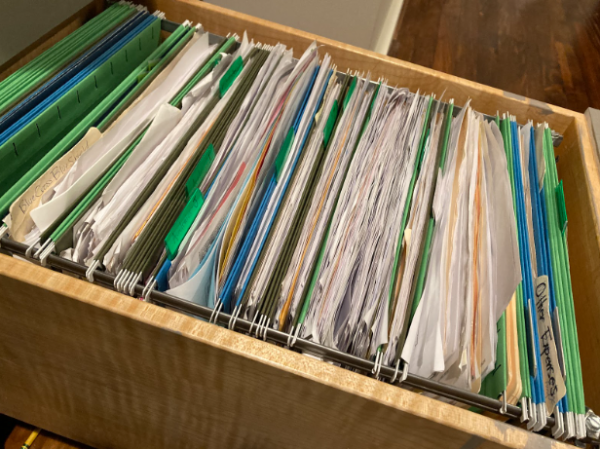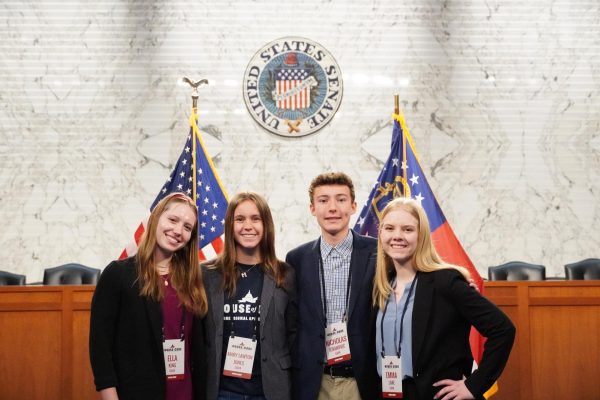Unfollow and Log Off: Reactions to Breaches of Privacy on Social Media
Senior students sit outside during lunch using their cell phones.
In need of cash, fast? Forget going to the pawn shop to sell off grandma’s jewelry. An app, called Facebook Research, which was available to users starting in 2016, would pay users up to $20 a month for the ability to track everything they used on their phone. This included a record of photos, messages, and websites visited. Facebook received backlash when news broke of this offer, and it was quickly removed from the Apple app store.
However, this is not the first time Facebook, nor Internet companies in general, have received backlash for their pursuit of user’s data.
“The safety of data online is, for the most part, really site dependent,” said senior Benjamin Blanck. “It’s often if you’re just a regular user it can seem very random with what is and isn’t up for sale.”
Facebook is an example of a website and app that has, in the past, shared user’s data. Many users aren’t equipped to differentiate between when their data is safe versus isn’t.
“Not knowing, as a consumer, what’s being used, really can hurt you in a lot of ways,” said Blanck. “There’s a lot of data breaches.”
Young adults, especially, are at risk due to their high rate of social media, which more than other age groups. According to a study done by the Pew Research Center in 2018, 95% of teenagers between the ages of 13 and 17 in the United States have access to a smartphone. Additionally, 85% reported they use YouTube and 72% Instagram.
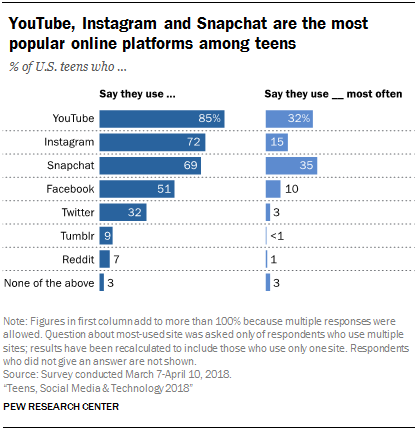
Senior Emi McCollum matches these statistics. McCollum, who owns a smartphone, uses social media on a daily basis.

Senior Emi McCollum uses her phone regularly for communication.
“I use Instagram and Twitter probably the most,” said McCollum.
She estimates that she uses her phone for around two hours a day.
Senior Chase Starks uses two additional social media that McCollum doesn’t use on a regular basis.
“The big three social media that I use would be Instagram, Snapchat, and Facebook,” said Starks
Teenagers, however, are not the only group at Chamblee Charter High School who have been affected by the digital revolution. Teacher Jessy Hamilton is an example of a teacher who has embraced a digital lifestyle.
“I use Instagram, Facebook, Twitter, Reddit, very rarely Snapchat,” said Hamilton. “Some daily, some of those — like Twitter — are just weekly, and each has a different purpose for me.”
For Hamilton, the bulk of his usage on these apps and websites is communication.
“I’ve moved around the country quite a bit, so this is my fifth or sixth state, so most of my family and friends are around the country,” said Hamilton, “… I use Facebook to keep in touch with family and friends, who I can’t just into my car and go see, so it’s sort of a daily interaction there.”
He uses different apps for a different group of people in his life.
“Instagram is sort of a select group of friends, it’s not so much family,” said Hamilton. “It’s more people my age and younger, as opposed to my age and older, so there’s kind of a generational divide there. Twitter, I use exclusively for … interacting with my community, my elected officials, with businesses, and it’s not a daily thing.”
McCollum’s main reason for using social media so often is also for communication.
“I look at memes, like funny content, I send stuff to group chats and people send me stuff…,” said McCollum. “I like the sharing aspect with others.”
Starks uses social media for almost the same exact reasons.
“I use Instagram every day to see other people’s posts, I like to post stuff so people know what I’m doing, I can see other friends and I like to send a lot of funny videos and memes to my friends,” said Starks.
An Internet meme is generally a picture with text overlayed that conveys some sort of joke — often involving pop culture, like celebrities or television shows. But not everything Starks does online is just for fun. Because his social life involves people who he can’t see face to face every day, he needs access to the Internet to maintain these relationships.
“I would say my accounts are very important to me, because there are a lot of people that I’ve met over the summer or people that I don’t go to the same schools as … and I play tennis with a lot of people, and even if I don’t see them every day I can still hit [a tennis ball] with them, hang out with them, text them, and so social media’s important in that aspect,” said Starks, “… I can also keep in contact with my friends if I don’t see them at the school or if I just need to schedule something, it just makes everything a lot easier.”
Neither Hamilton nor McCollum nor Starks are alone in their reasons for using social media. According to the same Pew Research Center study detailed above, from the 31% of the teenagers who see the effect of social media as positive, 40% give their main reason as the ability to connect with others.
But what happens when private messages and data are exposed due to privacy beeches?
“No matter how much Internet safety we’ve been making in the past few years, we’re getting some of our biggest leaks ever,” said Blanck.
One notable instance of this was the Cambridge Analytica scandal. This complex storyline involving both politics and Mark Zuckerberg began in 2016 when President Trump’s election campaign hired Cambridge Analytica.
According to the New York Times, Cambridge Analytica, a consulting firm located in London, gathered political data from approximately 50 million people on Facebook. The information was personal and private, such what content a user reacted to with a like and who their friends were.
“Cambridge Analytica really wasn’t that it was ‘Oh no, Facebook is harvesting our information,’ because that’s what Facebook is built for,” said Blanck. “It was just that just that Facebook was doing it so openly with so many people, that they would allow this.”
Facebook’s general policy is focused on data being used for the common good.
“We use the information we have, including from research partners we collaborate with, to conduct and support research and innovation on topics of general social welfare, technological advancement, public interest, health, and well-being,” said Facebook.
But for the exchange with Cambridge Analytica, the data was exchanged to a consulting firm for political reasons, which violates this policy. The name in the center of the scandal is researcher Dr. Aleksandr Kogan. Kogan initially created an app that would connect to Facebook when downloaded and harvest data. Although he violated the policy, Facebook insists it reacted quickly to the problem several years ago and deleted any breached data. Additionally, even had there not been a scandal, all data on Facebook is eventually deleted.
“We store data until it is no longer necessary to provide our services and Facebook Products, or until your account is deleted – whichever comes first,” said Facebook. “This is a case-by-case determination that depends on things like the nature of the data, why it is collected and processed, and relevant legal or operational retention needs.”
Blanck is skeptical at the reliability of these promises.
“These companies, while they’re using them to be successful now, and while holding data is still useful to them, we’ve been shown that they may, when the business starts to fail, they could just dump all of it for cash,” said Blanck.
He points to what may be a relic in the past for some.
“MySpace is basically sort of gone into bankruptcy and they’re offering to sell all of the data, including all of their customers’ direct messages, email addresses, private information, and they’re selling all of it because they’re shutting down,” said Blanck.
Others are just as concerned, albeit for different reasons.
“I think everybody should be concerned about privacy, I really do, and I think that if there’s anything 2016 has taught us, it’s that we were very lax before,” said Hamilton.
The Cambridge Analytica scandal was, in fact, not the only scandal to do with social media in 2016. During the presidential election, a company based in St. Petersburg, Russia, called the Internet Research Agency, created advertisements encouraging voters to vote for the current president, Donald Trump, and not the Democratic candidate, Hillary Clinton. This is one of the topics the current Special Counsel investigation is looking into.
With privacy breaches stacking up on top of each other, it can be difficult to see any solutions. To try to remedy this, Mark Zuckerberg testified in front of the United States Congress in April of 2018. Hamilton remains skeptical that legislative action will help the situation.
“I think the average age, last I checked, was 62 or 63 [for Congressional members], so even when you have a hearing with Mark Zuckerberg, and he’s trying to explain …the basics of how that platform works … I don’t know how realistic it is to think they’re going to do anything,” said Hamilton.
McCollum believes the responsibility of protecting data falls onto the main two parties involved.
“Obviously, if you know that it could bite you in the … [butt], you’re not going to put it online, but I think it’s just like, the Terms and Conditions part need to be set [and] follow through with that and then if the communication is there between the users and the site, then I don’t see a problem with that,” said McCollum.
Starks emphasizes that users need to always think through any post they publish for a common sense check.
“There’s also a line you have to draw because you need to always watch what you’re posting because I’ve accidentally posted stuff that I didn’t want people to see,” said Starks. “Like when people first get their driver’s license, a lot of people post that and forget to block out their address and all that stuff, or when people are buying something and they accidentally post their credit card information.”
He sees privacy as a careful balance.
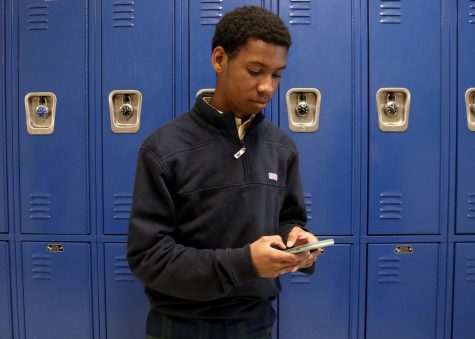
Senior Chase Starks sends a message while walking the halls.
“I think that the companies do have a certain privacy responsibility because you need to know what rights you have on those apps and what you can and can’t do, but I also think it’s mainly your responsibility because it’s your account, it’s your personal information,” said Starks. You’re putting stuff out there and so I guess these people, they can’t monitor everything you’re doing, so I think it’s really a self-responsibility.”
For parent Jon Brock, he has decided to take matters into his own hands to protect his data.
“My comfort with using the Internet has changed over the years,” said Brock. “I used Yahoo email for years but with more and more companies providing very little protection of personal information, I have started looking for European-based providers. I use a Swiss email account for most important personal finance information, checking, etcetera, along with a Swiss VPN.”
A VPN stands for a virtual private network. It allows users to access a private network and can allow for more security using encryption or passwords.
“When I’m on public wifi, I make sure the VPN is on,” said Brock. “That said, my Christmas shopping was 99% online. I think if you take precautions you can be as safe as possible online.”
Brock’s awareness of his safety online is due to personal experiences.
“I’ve been a victim of data information being ‘breached’ by retailers and Equifax,” said Brock
Equifax is a credit bureau that owns information about millions of consumers and their identities.
“Equifax is much more troubling because conceivably my Social Security number is out there floating around somewhere,” said Brock. “I’ve frozen my credit reports and am very protective about non-changeable information.”
He’s quite nervous about the possibilities of technology connected to identities.
“The idea of using facial scans and fingerprints seems to be crossing that line,” said Brock. “When the database of fingerprints is breached, what’s your option? You can’t change your fingerprints like you can the numbers on a credit card.”
Facebook takes a much different viewpoint on the dangers of sharing information.
“We provide advertisers with reports about the kinds of people seeing their ads and how their ads are performing, but we don’t share information that personally identifies you, information such as your name or email address that by itself can be used to contact you or identifies who you are, unless you give us permission,” said Facebook.
For now, though, Brock will focus on one of his most important jobs, raising his children in an increasingly digital world.
“I don’t feel comfortable with my kids using all social media options,” said Brock. “We let them use some social media to connect with friends, but we have tried to teach them about the dangers and pitfalls.”
One of the ways he has done this is by pointing to current headlines in the news.
“We’ve told them many times that what you do on the Internet never really disappears,” said Brock. “So if you post pictures or make comments, they may resurface later, much like we’re seeing in politics today.”
Brock has created rules to reflect this.
“My kids have had screen time limits since they were young and we have the right to go into any device they have at any time,” said Brock. “We honestly don’t want to spy on them or read their texts, but they know we expect them to make good decisions.”
Additionally, Brock sees the rise of social media as a simultaneous change in typical childhood experiences.
“When I was a kid, bullying couldn’t come into your house through a phone or social media,” said Brock. “Additionally, if you said or did something stupid, it might follow you around for a few days, but not usually weeks or months. Today, a comment or a photo can be everywhere in minutes.”
Brock and his wife have made sure to reflect this change in their advice to their children.
“We remind our kids to not post anything they wouldn’t say to someone’s face or any pictures that they wouldn’t want us to see,” said Brock “And most importantly, we tell them if you’re having issues, let us know because we can help you solve it.”
For Chamblee teacher and mother of two teenagers Jennifer Andriano, she is similarly aware of the dangers of social media.
“I don’t really police them [my daughters] but I definitely remind them that there certain things they shouldn’t put out there, especially specific details about where they are, addresses, or things like that,” said Andriano. “I always remind them, especially like Snapchat, recently got that … [Snapmap], and I’m like please don’t use that. It’s really kind of creepy.”
Over time, she has noticed changes in popular social media for teenagers.
“My oldest is 19 and I let her have Facebook when she got into high school, which was like her first big thing and it was really already starting to not be that big of a deal for high schoolers,” said Andriano. “We have family that’s out of town so it was useful.”
Now, her younger daughter is focused much more on Snapchat.
“Snapchat made me really nervous because of the whole things disappear quickly and you didn’t know what was there, so I think I erased Snapchat off of my younger ones’ [phone] probably five times before I was like ‘Ok, let’s talk about this. Clearly, you want it on there and your friends are all on it,’ I was like ‘I told you you can’t have this,’” said Andriano.
Statistics reflect this shift away from Facebook and towards Snapchat for teenagers. 35% of the teenagers surveyed by the Pew Research Center in 2018 say they use Snapchat the most often, but only 10% use Facebook the most often.
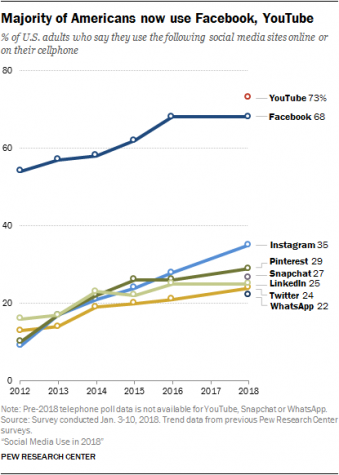
For Starks, Facebook is only something he must use for academic reasons.
“Facebook is mainly for school. I kind of just use it to keep up with Beta Club, NHS [National Honors Society], other stuff, senior stuff,” said Starks.
McCollum is not the most seasoned Facebook user, but she still has an opinion on their privacy policies.
“I don’t really use Facebook, so I don’t feel super strongly about it, but obviously I do … [agree] that if in the terms and conditions, it says something, it should stick to that,” said McCollum.
The number of Facebook users among adults is quite different than for teenagers. According to another study conducted by the Pew Research Center in 2018, 68% of US adults use Facebook, and only 27% Snapchat.
Hamilton uses Facebook for a very specific purpose.
“Facebook [posts] tends to be a little more mundane, but also because of my past running for public office twice, I have lots of folks involved with politics on my Facebook, so I also tend to share an article or something of that variety,” said Hamilton.
However, for some adults, they avoid all social media.
“I don’t use Facebook or any other social media platform,” said Brock. “It never interested me. Similarly, I don’t use Google. Both are ad-based companies that profit by mining as much information from their users as they can.”
Some Facebook users have tried to find a happy medium, such as Andriano. Although she uses Facebook, she also takes precautions.
“I get nervous, just recently, probably the last couple years, people are like ‘Don’t post stuff about your vacation when you’re on vacation because then people will know you’re not home,’ but my address isn’t anywhere on there, so I never post vacation pictures until we get back home,” said Andriano.
One of the most common ways that users can adjust their privacy and by setting who can view their account. For example, a private account is only allowed to be viewed by approved followers.
“My Twitter is public and my main on Instagram is public, and then I have my spam [Instagram account] which is private,” said McCollum.
McCollum’s main Instagram account and spam are very different.
“I use my spam for things that I would not want to put on my main… my spam will be like silly photos or like updates of what I’m up to,” said McCollum. “But there are things I don’t share on either, because it would just be unnecessary to share.”
Starks has experimented with is privacy settings has learned an important lesson.
“My Instagram it fluctuated, I guess,” said Starks. “So I took it off of private for a sec[ond] and made it a business account and then random people started following me and so then I made it back to private because I just don’t want people who I don’t know looking at all my of stuff, which is a bit awkward.”
For Hamilton, years of experience on social media has heavily shaped the way he posts and protects his identity.
“Especially as I’ve gotten older, I’ve tried to refrain from posting so many controversial things, just because of the Internet mob,” said Hamilton. “I try to keep it light and not too serious, although sometimes you know, being a teacher, it goes down that road.”
He considered himself both knowledgeable and safe when using social media.
“I still share information and I’m pretty good, I like to think I’m savvy at figuring out if there’s a troll who’s not supposed to be there,” said Hamilton.
As such a frequent user, he actually has a few solutions in mind when it comes to protecting users data.
“One of the things I like is the idea of having official accounts,” said Hamilton. “So, Mr. Hamilton has an official Facebook account, and …. somehow it has been verified to connect to my identity, as opposed to operating potentially 10 or 20 different accounts under different guises.”
On the other end of the spectrum, he sees some work for large social media companies to do.
“Another is being more explicit with privacy policies. Giving users more control. I kind of think we’re going backwards with user control, even though the news says otherwise,” said Hamilton.
Starks shares a pessimistic view of the future of user’s data online.
“I think in the future, as more and more people are using social media, I think that this whole situation of privacy will become a bigger problem because more people will be using it, and I think that a lot of people just don’t know the dangers of social media and I don’t think that we will pay a lot of attention to it until something big happens, which is kind of sad to say but we never pay attention to something until something tragic … happens,” said Starks.
For now, though, many users are concerned with what they themselves can do right now to protect themselves. Blanck has simple advice.
“I would recommend, if you want to do things on social media, just be careful and don’t share anything too private,” said Blanck.
He recommends to acknowledge the system in place and adapt to it.
“Social media, the successful social media companies, are all just built around data harvesting, so just know what you want to be harvest[ed for],” said Blanck. “Don’t ever assume that anything’s private.”
Your donation will support the student journalists of Chamblee High School Blue & Gold. Your contribution will allow us to print editions of our work and cover our annual website hosting costs. Currently, we are working to fund a Halloween satire edition.

Hope Williams is a senior staff writer. When she's not churning out articles, you can find her playing with her cats or going on a hike. This is her second year on the staff.

